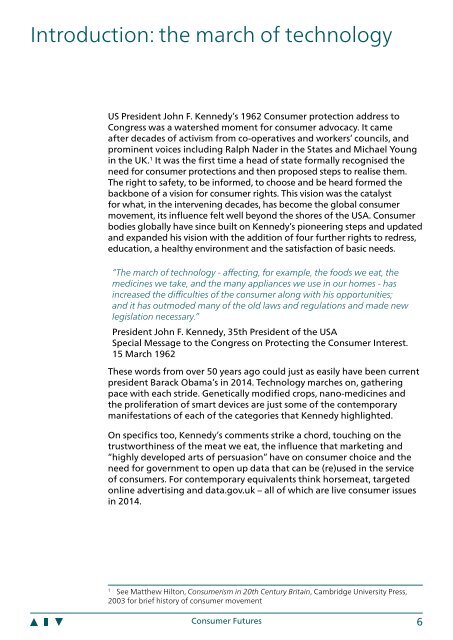Realising-consumer-rights
Realising-consumer-rights
Realising-consumer-rights
You also want an ePaper? Increase the reach of your titles
YUMPU automatically turns print PDFs into web optimized ePapers that Google loves.
Introduction: the march of technology<br />
US President John F. Kennedy’s 1962 Consumer protection address to<br />
Congress was a watershed moment for <strong>consumer</strong> advocacy. It came<br />
after decades of activism from co-operatives and workers’ councils, and<br />
prominent voices including Ralph Nader in the States and Michael Young<br />
in the UK. 1 It was the first time a head of state formally recognised the<br />
need for <strong>consumer</strong> protections and then proposed steps to realise them.<br />
The right to safety, to be informed, to choose and be heard formed the<br />
backbone of a vision for <strong>consumer</strong> <strong>rights</strong>. This vision was the catalyst<br />
for what, in the intervening decades, has become the global <strong>consumer</strong><br />
movement, its influence felt well beyond the shores of the USA. Consumer<br />
bodies globally have since built on Kennedy’s pioneering steps and updated<br />
and expanded his vision with the addition of four further <strong>rights</strong> to redress,<br />
education, a healthy environment and the satisfaction of basic needs.<br />
“The march of technology - affecting, for example, the foods we eat, the<br />
medicines we take, and the many appliances we use in our homes - has<br />
increased the difficulties of the <strong>consumer</strong> along with his opportunities;<br />
and it has outmoded many of the old laws and regulations and made new<br />
legislation necessary.”<br />
President John F. Kennedy, 35th President of the USA<br />
Special Message to the Congress on Protecting the Consumer Interest.<br />
15 March 1962<br />
These words from over 50 years ago could just as easily have been current<br />
president Barack Obama’s in 2014. Technology marches on, gathering<br />
pace with each stride. Genetically modified crops, nano-medicines and<br />
the proliferation of smart devices are just some of the contemporary<br />
manifestations of each of the categories that Kennedy highlighted.<br />
On specifics too, Kennedy’s comments strike a chord, touching on the<br />
trustworthiness of the meat we eat, the influence that marketing and<br />
“highly developed arts of persuasion” have on <strong>consumer</strong> choice and the<br />
need for government to open up data that can be (re)used in the service<br />
of <strong>consumer</strong>s. For contemporary equivalents think horsemeat, targeted<br />
online advertising and data.gov.uk – all of which are live <strong>consumer</strong> issues<br />
in 2014.<br />
1<br />
See Matthew Hilton, Consumerism in 20th Century Britain, Cambridge University Press,<br />
2003 for brief history of <strong>consumer</strong> movement<br />
Consumer Futures 6


